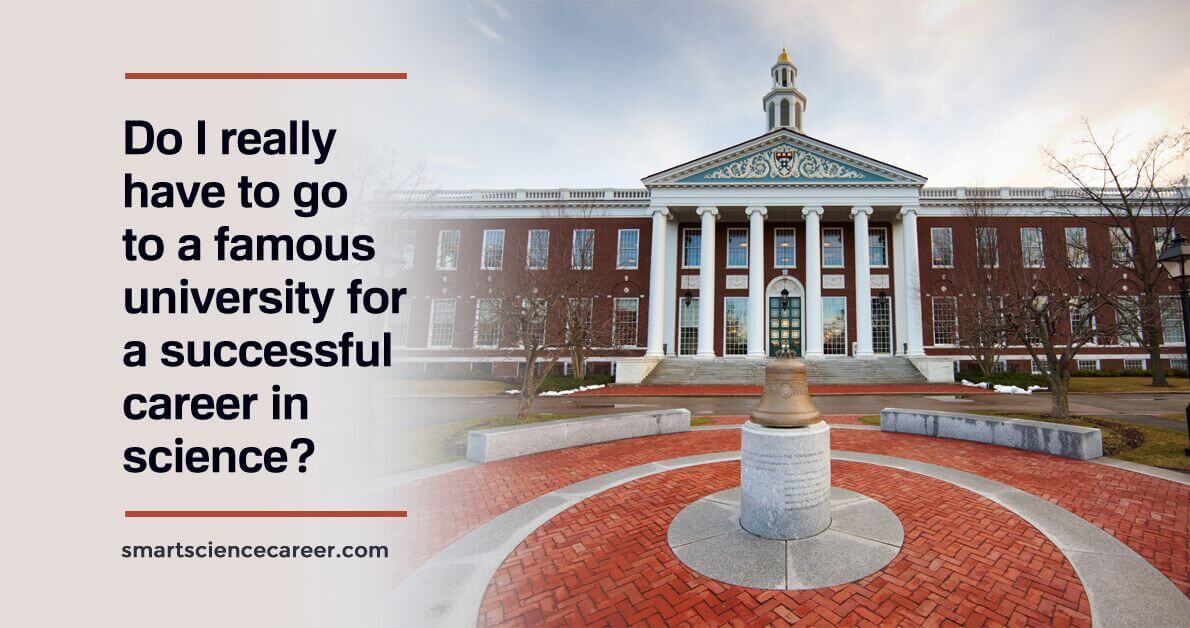Is going to a famous university necessary for a science career?
Everybody will tell you that going to a famous university is essential for a successful career in science. Important arguments are the network you build (for example, via alum associations), the excellent infrastructure, and the great scientists you might connect with. However, is it real – or is it a myth?
Does attending a famous University make you more famous?
Undoubtedly, specific elements in your CV will make you attractive as a job candidate or grant applicant and support a high-class reputation.
For example, if you have recently published a paper in a high-impact factor journal (e.g., in NATURE or SCIENCE) as a junior scientist or several high-impact papers during the last five years as a senior scientist, this will be noted by your colleagues.
Similarly, it will be noted and mentioned when you have attracted a big grant, received a prestigious prize, or worked in a famous scientist’s lab.
Typically, this will be mentioned when you are introduced as a speaker during a scientific meeting or when a press release is published.
It will also be mentioned when you have studied or worked at a famous university.
Thus, there is a particular value in attending an elite institution to promote your reputation.
It does not matter where you get your college/university degree!
Firstly, I must point out that finding hard data on this issue is not easy.
However, a few studies suggest that it does not matter economically where you get your college/university degree.
In a landmark study by Alan Krueger and Stacy Berg Dale and a follow-up study it has been shown that it does not have a significant effect on your earnings whether you attended an elite university such as Harvard or not.
Surprisingly, there is no “Harvard effect” when you compare graduates 20 years later.
However, remember that these studies focused on the economic effects! Salary is only one of several crucial factors to choose a position.
Interestingly, there seems to be a positive effect on career development for students from more disadvantaged family backgrounds. In a thoughtful analysis, Derek Thompson summarized it as follows:
“Research suggests that elite colleges don’t really help rich white guys. But they can have a big effect if you’re not rich, not white, or not a guy.”
It is important to note that these studies have a US-American perspective and do not specifically focus on specific fields, such as life sciences. In addition, please keep in mind that economic outcome is only one of many important parameters that can be used to judge the success of a career.
Especially in science, many, if not most, people are not primarily focused on earnings. Instead, they strive for a meaningful job and want to create an impact on science and society.
Read more here: What is “a successful career” in science?
Forty years ago, elite colleges offered a demonstrably higher level of education.
Nowadays, many universities and colleges provide a high level of education at much lower costs. The reputation of the place where you got your degree is also elusive.
It may play a role when you apply for your first job, but 5 to 10 years later it counts much more how you have performed in your previous jobs.
Thus, if you choose well, you may also get a high level of education at less expensive places. It does not seem to hurt to go to an elite college, and it may be a useful label of excellence on your CV, but the added value is not easy to pin down
Should I do my PhD or postdoc at a highly-ranked University?
Labels such as “a famous university” or “an elite college” are very vague and heavily influenced by clever marketing to form public opinion.
Smart people have developed University rankings that strive to be more objective. A typical example is the Times Higher Education World University Ranking. I wrote another article on whether medical school rankings matter – and if yes, under which circumstances.
It is critical to understand how university rankings are generated to get a realistic idea whether you should do your PhD (or postdoc) at a highly-ranked institution, .
Mark Bennet provided a very helpful analysis whether university rankings matter for PhD studies. Briefly, he lists three points you should consider when using University rankings:
Firstly, it is no surprise that the research performance is relevant primarily to young researchers.
Secondly, the teaching performance may be relevant for students and educators. Typical parameters are the ratio of PhDs to undergraduate degrees awarded and the total number of doctorates awarded.
Thirdly, the rankings help to find the most highly ranked institutions in selected countries.
Thus, you may discover elite institutions not only in the USA but also in many other countries such as the UK, Germany, the Netherlands, Switzerland, Canada, China, etc.
International education is also an important parameter. Especially in times of rising nationalism and racism, it is an important parameter whether an institution is open to international students (= foreigners).
Mark Bennet concludes that University rankings are helpful, especially when you look closely at the ‘sub-rankings’ summarized above that might matter for PhD students and postdocs.
However, a reader who critically analyzed an early version of this text pointed out that the arguments I am advancing in this article may be only made by Europeans:
“I have never heard any American or Asian seriously doubt the importance of institutional rankings. Rather, the exact opposite is abundantly evident at Harvard Yard, which is teeming year-round with ‘foreign pilgrims’.”
Probably, he is right.
The biggest problem with University rankings is that they use selected metrics and describe the performance of a University in very general terms.
It does not tell you whether your potential future supervisor is excellent or not as a supervisor or as a scientist.
It does not tell you whether your supervisor is a great person and supports you or whether he/she is an authoritarian sadist who will traumatize you for the rest of your life.
You can have a great or lousy research stay at a highly-ranked University
It is much more essential to select a PhD or postdoc position based on the performance of your future boss as a supervisor and scientist.
Briefly, if former and current PhD students and postdocs report that they experienced the environment and the supervisor as very stimulating, it is a good sign.
Unfortunately, you cannot exclude that their supervisor has instructed them to tell you fairy tales to convince you to come.
If the publication list of the supervisor is very promising and the younger lab members have appropriate positions in the author’s list of previous publications (first or last or equally contributing first or last author), it is another good sign.
It is a red flag when there is a high turnover of young researchers who do not finish their papers or thesis. High ambition and pressure may stimulate some young researchers and be destructive to others. Pressure and pleasure are two very different motivators for young scientists.
There are many advantages of doing a PhD or postdoc in a great lab
Above, I have been somewhat critical about focusing too much on elite institutions because I am convinced that you profit much more when concentrating on working in a great lab. This great lab can be either at an elite university or a less prestigious institution.
A successful research stay in a great lab has many advantages.
- You learn how to think like an excellent scientist.
- You learn how a high-performance lab is organized.
- You learn how to publish in journals with high impact factors (at least you get to know the best practices that may work).
- You may be trained in high-end technologies or even (co-)develop a breakthrough technology.
- You may stay in contact or collaborate with your colleagues long after leaving the lab.
- You may leave with one or two excellent publications in high-impact journals.
Thus, there are many reasons to find the perfect lab to do your PhD and postdoc.
But they all tell me that I can *only* become a professor when I have done my postdoc at an elite institution!
The most critical question in this context is: Who is “they all”?
Usually, people refer to a maximum of 1 or 2 persons who firmly state that it is obligatory for getting a tenured professor position to have worked at an elite institution.
The best way to get a clear head and make good decisions is to get as many opinions and perspectives as possible.
If you got this information from a tenured professor at your institution, go to at least two other professors and ask them what they think about this opinion. You may get consistent feedback such as “In our institution, we have only hired professors who have worked in Harvard/Yale/….”
Or you may get a mixed response: “Yes, it helps, but we also have professors from less prestigious universities.”
Will it help me to get hired as a professor?
There is no doubt that deans and selection committees like to hire people who come from elite institutions because it seems to increase the value of their own institution.
In psychology, this is called the association fallacy. Thus, honor by association means that someone or something must be reputable because of the related organizations.
However, if another candidate has a better publication list and has raised more grant money, it will not help you.
Besides, especially at smaller or regional institutions, there may be more chances for young researchers who have not published Nature or Science papers and who did not come from an elite university.
Read more here: Do I need Nature or Science papers for a successful career in science? and Should I choose a big or a small university?
Should I take a loan to finance a stay at an elite institution?
One of my readers asked me whether she should take a loan to finance the stay at a US elite institution or attend a less famous (but still excellent) European university.
My very, very personal opinion is that taking a loan to finance your PhD or postdocs at an elite institution is a bad move.
Economically, you may put a lot of debt on your shoulders for many years with an unclear investment return. However, you might apply for multiple grants to circumvent this problem.
Yes, you may build your reputation, and whenever you give a talk, you may be introduced with “… he worked at [famous university] in the lab of [famous researcher]…”.
Yes, you may work in a fantastic environment with a lot of money and intellectually stimulating, high-performing scientists.
However, there are genuine downsides to attending elite institutions, most notably high housing costs.
Living in a typical university city such as Boston may be extremely expensive, especially if you have small children needing daycare. However, if you are a high performer, always consider free or fully funded PhD programs that may reduce the financial stress.
If in doubt – do *not* take a loan.
It is much more useful to choose a great lab that fits perfectly with your skills and expertise in a less expensive institution and to perform on an excellent level.
If you want an industry job or any other non-academic job, it is questionable whether a stay at an elite university is worth the money and the effort.
If you want to become a tenured professor, several parameters qualify you as an academic high-performer – you will be primarily judged by your publication list and the grant money you have raised. However, you should always start with the question of whether it is worth it to become a professor.
Besides, especially at smaller or regional institutions, there may be more chances for young researchers who have not published Nature or Science papers and did not come from an elite university.
Read more here: Do I need Nature or Science papers for a successful career in science? and Should I choose a big or a small university?
Conclusions
In conclusion, there are only a few good reasons to study at an elite university.
There are strong arguments for doing your PhD or postdoc at an elite institution, but the return on investment is difficult to measure.
However, in my very personal opinion, it is much more effective to choose a great lab that fits perfectly with your skills and expertise and to perform at an excellent level.
If this happens to be at an elite institution – even better.
Recommended reading
The following articles may also interest you:
- Should I study medicine, dentistry, or life sciences?
- Should I choose a big or a small university?
- Do I need nature or science papers for a successful career in science?
- Free PhD programs versus fully funded PhD programs
- How long does it take to complete a doctorate?
- Does medical school ranking matter?
- Do I really have to work abroad as a scientist?
- How to choose the best postdoc position?
- Should I quit my postdoc?
- Is being a professor worth it?
- What is tenure?
- 10 simple strategies to increase the impact factor of your publication
- Assistant professor and associate professor – what is the difference?
- What is a Reader at a university?
- Why salary matters in science careers
- How to ask for a letter of recommendation?





A reader wrote: “Since I started at Harvard I’ve received weekly emails requesting me to apply at nearby pharmaceutical and biotech companies with starting salaries around 100k USD. So I think these are a great plan B if my academic applications are not successful. Also, I’ve noticed that people from Harvard Medical School labs (at all levels from technicians to group leaders) move to higher-paying positions in the industry at a rapid rate. This is something I have not seen anywhere else. This is anecdotal, but I suspect companies such as LinkedIn and Glassdoor would have plenty of data to quantify the Harvard effect.
Nevertheless, in your post you could probably use stronger language to discourage people from taking loans for a PhD or Postdoc in the US. Elite universities are not charities but (exploitative) big business. Taking loans for PhD/PostDoc in the sciences is a bad idea and fully unnecessary since there is a lot of funding to support research globally.
I read this manuscript that analyzes the effectiveness of EMBO longterm fellowship application peer review. It contains some relevant data:
Talent Identification at the limits of Peer Review: an analysis of the EMBO Postdoctoral Fellowships Selection Process
https://www.biorxiv.org/content/biorxiv/early/2018/12/08/481655.full.pdf
“Fine discrimination among high-quality applicants is not straightforward and may lead to decision bias [16]; “when there is no objective basis for choosing one qualified candidate over others, people naturally fall back on subjective preferences. A selection committee might consciously or unconsciously favour certain research topics, groups of people or even individuals” [15; p. 7]. Social indicators analyzed include the prestige of former and future supervisors, the prestige of former and future scientific institutions where the candidate has worked or will work and the effect of the country of nationality of the candidate as well as the countries where they have worked and plan to work in the future.”
Institutional prestige measured using a performance-based institutional ranking as a proxy (see Methods) did reveal a small effect (ANOVA, P=0.29439 for the PhD institution and P=0.032588 for the host supervisor institute).
But notably only applicants from high ranking institutions qualified in the first place:
“most preselected candidates obtained their PhD in highly ranked institutions and plan to continue with their careers in also highly ranked host institutions”
The authors come to the conclusion that peer review is effective in distinguishing poor applications from good ones but fails at ranking high-quality applications (they propose a random allocation of resources which I suspect is not going to happen). As a junior scientist you’re repeatedly participating in competitions like this and this is exactly where institutional prestige translates into a permanent advantage. Yet the weak association implies you need to accrue every possible advantage on top of that and to participate in the maximum number of competitions possible.
Interestingly they identify this major myth:
“Also interesting to note is the fact that despite the still pervasive misuse or JIFs as a proxy for individual performance and scientific quality in evaluation processes, we did not find any significant association between the JIFs of the first author publications published by candidates at the time of application (as a graduate student) and their future career progression.”